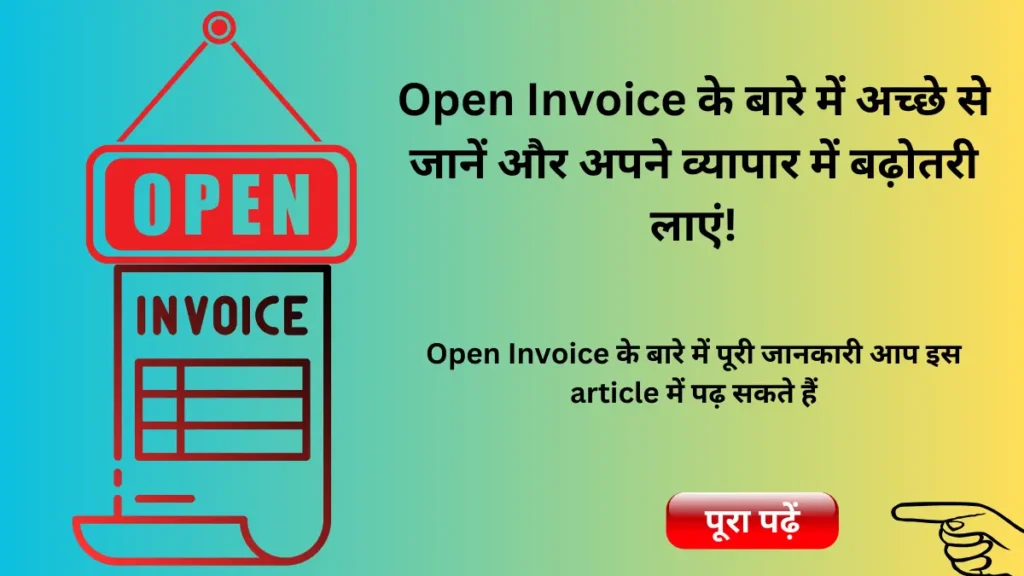An Open Invoice simply means an invoice that has not been fully paid yet. When you provide a product or service to a customer and give them a deadline for payment, that invoice is considered an open invoice. Did you know that managing open invoices properly can be highly beneficial for your business? Learn how managing open invoices can improve your cash flow, along with the challenges and solutions associated with it. Let’s break it down in simpler terms through this article, so you can effectively use it in your business.
What is an Open Invoice? And its Example.
An Open Invoice means a bill (invoice) that has not been fully paid yet. When you provide goods or services to a customer and set a specific deadline for payment, the bill remains open until the customer pays it in full.
Example:
For instance, let’s say you purchased goods worth ₹10,000 from a store, and the shopkeeper gave you 30 days to make the payment. The invoice will remain open until you pay the ₹10,000. Once you make the payment, the invoice will be closed.
Importance of Open Invoice
The importance of an “Open Invoice” in the business world is significant. It is not just an outstanding bill but plays a crucial role in managing your business’s financial position and cash flow. When you manage open invoices properly, you can strengthen your business position and improve your financial strategies. Let’s understand the importance of open invoices.
1. Controlling Cash Flow
An open invoice is a way to track your outstanding payments. It helps you understand how much money you are yet to receive and how it will impact your cash flow. If you have open invoices, you can accurately predict how much money will come in the future, allowing you to manage your other expenses more effectively.
2. Assessing Financial Condition
An open invoice also reveals your business’s financial position. It helps you understand how much outstanding amount you have and from whom you are yet to receive payments. This information aids in making informed business decisions and provides you with an opportunity to assess your financial health in a timely manner.
3. Maintaining Good Relationships with Customers
Properly managing open invoices helps ensure that your customers make payments on time. If a customer delays payment, you can send reminders and request payment. This approach helps in maintaining good relationships between you and your customers.
4. Helping in Business Decisions
Keeping track of open invoices significantly aids in making business decisions. You can see how much is owed by each customer, helping you decide whether it is safe to continue doing business with a particular customer. This ensures that your business remains secure and profitable.
5. Assisting in Loan Acquisition
Sometimes, tracking open invoices can assist in your loan application. If your open invoices are being tracked well, it reflects the liquidity of your business and helps in securing a loan more easily.
6. Option to Charge Interest and Fees
With open invoices, you have the option to charge interest or late fees on overdue payments. This strategy encourages customers to pay on time and helps in maintaining your business’s financial health.
Ways to Track Open Invoices
If you are running a business, it’s crucial to track open invoices effectively. This helps you know which payments are being received on time and which are pending. Now, let’s look at some easy ways to track your open invoices:
1. Use Automated Software
If you have many invoices, you can use good software or an app. This software automatically tracks your outstanding payments and invoice dates, meaning you won’t have to manually check every time. It will remind you when and from whom to expect payments.
2. Use a Spreadsheet
If you prefer not to use software, you can create a spreadsheet (like Excel or Google Sheets). You can enter invoice numbers, customer names, outstanding amounts, and payment dates. This allows you to easily see which payments have been made and which are still pending.
3. Check Regularly
To track open invoices, you need to check them periodically. You can review them weekly or monthly to see which invoices are paid and which are still pending.
4. Maintain Contact with Customers
If a customer is delaying payment, it’s important to remind them. You can notify them via email, phone calls, or messages. This helps the customer remember what needs to be done, and they may make the payment faster.
5. Clarify Invoice Terms
At the start, clearly communicate the invoice terms to all your customers, such as the payment due date and the timeframe within which payment should be made. This ensures customers know when to pay, preventing any issues.
6. Create Reports
To track open invoices, you can create a report. It will allow you to see how many invoices are outstanding and how much is owed by each customer. This keeps you updated on your business status.
7. Apply Interest and Charges
For overdue payments, you can apply interest or extra charges. It’s important to track these so that you receive payments on time.
Benefits of Open Invoices
Open invoices have several benefits that can be extremely advantageous for your business. Let’s explore some of them:
1. Helps Track Your Money
Open invoices help you see how much you are yet to receive from each customer. This lets you plan your business cash flow effectively and gives you a clear picture of when and where the money will come from in the future.
2. Keeps Your Business Running Smoothly
By tracking open invoices properly, you can identify which customers are paying on time and which are not. This allows you to ensure timely payments and keeps your business running smoothly.
3. Improves Financial Health
Tracking open invoices helps maintain the financial health of your business. It lets you know how much money is coming in and how much is outstanding, helping you manage your expenses and investments more effectively.
4. Builds Strong Customer Relationships
Proper tracking of open invoices helps build strong relationships with customers. When you remind customers about their payments on time, they view you as reliable and professional, which strengthens the relationship between you and your customers.
5. Allows Charging Interest and Fees
If a customer delays their open invoice payment, you can charge interest or extra fees. This motivates the customer to pay on time, ensuring you get your money promptly and preventing disruptions to your business.
6. Easier Business Planning
Tracking open invoices makes it easier to plan for your business. Knowing how much money will be coming in allows you to plan your expenses and investments properly.
7. Assists in Loan Acquisition
Tracking open invoices clearly shows the liquidity of your business. If you need a loan in the future, this tracking helps you in applying for a loan.
Drawbacks of Open Invoices
Although open invoices can benefit your business, if not managed properly, they can also cause certain issues. Let’s look at the potential drawbacks of open invoices:
1. Cash Flow Disruption
If customers do not pay on time, it can disrupt your business’s cash flow. This can make it difficult to cover daily expenses such as wages, utility bills, and other essential costs.
2. Increased Dependence on Customers
If you have many open invoices, your business becomes dependent on customers paying on time. Any delays in payments can place your business under financial strain.
3. Increased Need for Loans
If customers fail to pay on time, you may need to take loans to cover your expenses. This adds an extra burden of interest to your business, weakening its financial health.
4. Interest and Penalty Costs
If you are unable to pay your suppliers or other bills on time due to outstanding payments, you may have to pay interest or penalties. This increases your costs.
5. Damaged Customer Relationships
Constantly following up with customers for payments can sometimes negatively affect your relationships with them. This can impact your future business dealings.
6. Decreased Liquidity
If you have many open invoices and they remain unpaid, your business may experience decreased liquidity, making it difficult to cover sudden expenses.
7. Bad Debt
If a customer does not pay for an extended period, the amount remains unpaid, and you may never recover it. This is known as bad debt, which can directly impact your business’s profitability.
8. Impact on Business Growth
If your money is tied up in open invoices for too long, you may struggle to raise funds for new investments or business expansion. This can hinder the growth of your business.
How to Resolve Open Invoice Issues?
- Take an advance payment from customers.
- Clearly mention payment due dates from the start.
- Send reminders via messages or emails.
- Use simple software to track invoices.
- Apply a penalty on late payments.
- Build long-term relationships with reliable customers.
- Regularly check your outstanding invoices.
- Prioritize customers who pay on time.
- Set strict rules for customers who delay payments.
- Offer easy and fast payment options (like UPI, online banking).
- Encourage timely payment by offering discounts or benefits to large customers.
- Keep customers informed about their outstanding balances.
- Consider legal assistance if payments remain overdue for too long.
Summary
Open invoices are a method to track how much money you are still owed. When handled properly, they ensure timely payments and smooth business operations. However, if neglected, they can cause financial challenges. By adopting the right practices and taking action on time, you can address these challenges. Keep track of your outstanding payments and keep your business moving forward.





